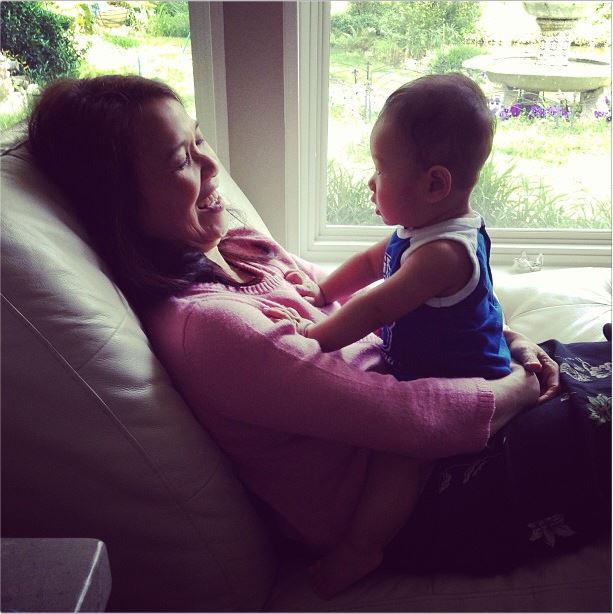
She swirled the soup a few times with her ladle and took a sip. “Do you like canh bun tau?” I glanced at the bubbling broth, plain with a sprinkling of green herbs, and the accompanying clear bean thread noodles, and shook my head no. I couldn’t remember if I liked this dish but was mostly too lazy to make myself some. Instead I filled a bowl with rice and stacked several cuts of ga luoc (steamed chicken) on top.
As I sat down my mom followed – she brought me a bowl of soup anyway, alongside a dipping sauce for the chicken – fried green onion, garlic and ginger muddled in soy sauce and fresh chilies. Garnishes that elevated meals into experiences. I reveled in the chicken – plump and juicy from being cooked at the perfect time and temperature – a basic dish that was still light years ahead of my own. As I stopped to sip the soup broth, she reappeared with a red canister filled with dried onions that she sprinkled on, telling me they’d make the soup more aromatic. They did; never had such simple ingredients been combined so masterfully.
Eating her food always made me happy and sad – it was perfect in a way that I could never place. I had tried my hand at all of her best recipes, exactly following instructions to add a “dash” of this and a “spoon” of that (though she never specified whether table or tea), but re-creation was impossible. My attempts were good but lacked complexity; there was always that certain something I couldn’t get right. And in the midst of failure I simply chose to drive the thirty minutes to her house where I could find the real deal.
I hoped with time (after all, she’d had a twenty-five year head start) I would begin to uncover her secrets or, if I was lucky, develop my own recipes for my daughter to imitate. I had grown more sentimental with the birth of our children, and couldn’t help but feel myself already missing the comfort of her food and what it would be like to taste some of those dishes for the last time.
I often blamed my counterfeit cooking on being born in the United States. I could gather the right ingredients from our local Asian grocery, but wasn’t creating from the heart. I could assemble the same plate of mint, basil and cilantro as my mom’s, but wasn’t drawing from a deep memory of home, where chicken was plucked from the backyard for dinner and street vendors sold hot silken tofu strained and pressed from soya beans just hours before. I had come from a land of frozen pizzas and fish sticks and blended pink mush colored and molded to look like meat.
My parents immigrated over at seventeen and eighteen years old, both with large families and plopped down in the middle of rural Louisiana where they would eventually meet. In the seventies the US had barely evolved past segregation – separate was no longer equal but people were simply expected to hide their bigotry rather than change it. In southern Louisiana, that meant name calling and degradation in lieu of mob violence.
My father recounted stories of getting robbed and beaten, unfairly terminated from jobs, and getting into daily fistfights at school – he couldn’t understand their insults but felt their hatred, and communicated back in the only way he knew how. His survivor mentality would often reappear later in our teenage lives in the form of public embarrassment. In his younger days he found striking the bear before the bear could attack was the best defense, but as the world progressed, the tangible threats grew less along with his instincts. Slow cashiers and incompetent waiters were often at the receiving end of his misplaced anger, a father lion fiercely protective of his distinctly Asian cubs.
I had many memories living in our one-bedroom (now condemned) home, all happy and far removed from the sleepless nights my parents went through to make sure we were fed and cared for. Our living conditions were less than perfect but we were none the wiser – we were surrounded by love and nothing else was needed. Like all children, my memories through my teenage years are spotty.
My parents moved up in the ranks of life like players in a game of Monopoly. Roll the dice, pass GO: collect a job promotion. Roll again, pass GO: have a baby, job promotion and pay raise. Pass GO: collect a new house. Pass GO: promotion for both parents and a newer, bigger house. We moved four times in ten years, finally landing in a beautiful 5-bedroom, 3 bath home in tree-lined suburbia – bright red brick complete with pool and little white dog. The further away from the Louisiana shack we moved, the more we forgot that it existed.
I was the only one old enough to remember those days and my youngest sister, eleven years my junior, would never know the feeling of shared beds and week-long re-purposed leftovers. Garage-sale toys and second hand clothes were replaced with weekly shopping sprees – I developed a thirst for new things even when I had unworn items with tags still lining my closet. The spoils quickly became the norm.
On weekdays you would find me planted in front of the computer, staring at homework I pretended to do while chatting with friends on a minimized box in the corner of the screen. As my mom passed behind me, hands full with plastic grocery bags, I tried to be invisible. She would eventually notice her three daughters sitting idly and pause from the trips to and from the car to quietly ask for help from the older two. We always helped, but not without the addition of our exaggerated huffing and puffing. It was implausible that we were expected to complete our schoolwork and help with household chores. The struggles of high school should surely have eclipsed our obligations to cook and clean. After all, she was the mom; we were the children.
But before we could finish our excuse making, dinner was hot and ready on the table. The delicious smells pulled us to the kitchen, farm animals gathering to enjoy the little red hen’s hard work (oh, but we will help you eat the bread!). It was that way for most nights. My parents were able to escape oppression and poverty but could not hide from the selfish entitlement of their children. It wouldn’t be until years later, my puffy and dark-circled eyes covered in mashed peas from an unruly toddler, that I would begin to understand the sacrifices they made for us. My parents had been cleaning the proverbial peas from their faces our entire lives.
It was there at my parents’ dining table I sat, in my thirties and enjoying yet another lovingly prepared meal by my mom, when it hit me. The appreciation, shame, and repentance – all unleashed with a bite of steamed chicken.
As I cleared the table I watched her continuing about her day – tending to my grandmother, ninety years old and left fragmented from several stroke episodes and rising dementia. Her once sparkling eyes were now gray and cloudy and fixated on a grain of rice that had tumbled its way to the edge of the table. During meals her silent staring was abruptly broken by a string of questions in Vietnamese that escaped her lips at an uncontrolled speed and volume. “Did you eat dinner? Say grace before you eat. Where’s your husband? How’s his family?” I’d answer, sometimes five or six times to the same question, and she would focus her attention back to an unidentified spot in the distance.
A devout Catholic woman and a matriarch to the most traditional of Vietnamese families, she had served as dutiful wife and mother to ten children for all of her adult life, learning only to hone the art of preparing meals and folding laundry. Without outside interaction and a limited emotional relationship with my grandfather, her brain lacked the daily stimulative exercises needed to fight the cell deterioration that would take over her later years. After my grandfather passed and she was hit with her first stroke, she was shipped off to California to stay with my mom’s older sister. She stayed at my aunt’s modest home in Garden Grove, where she was relegated to a tiny study located right off the kitchen. With an elderly father-in-law also living there, the house turned into a cramped nursing home, dark and depressing and unsuitable for both old and young – I felt for my two little cousins who played at hushed volumes as to not disturb their grandparents.
During this period my grandmother was left to her own devices; my aunt left for work every morning at five am and didn’t return until dark, leaving my grandmother with a caretaker who only roused her from bed to bathe, feed, and medicate her. There was no daily conversation, no physical therapy, no real rehabilitation. Years later when my mom was finally able to convince her to come to Texas, where most of her family lived and she’d have her own living quarters, she was too far gone to appreciate the improvements. She had to be weaned off of excess medications, most of the sedative variety, and in her now longer waking hours the only solace was to complain. She had to be coerced into daily exercises consisting of short assisted walks around the house and light pedaling in front of a sunny window. She screamed through all of these activities like she was being tortured while my mom calmly reasoned by her side. Her Catholic faith had manifested itself into a radical obsession – over the course of a year my mom left work early every evening to take her to mass and bible study groups on the weekends. She drove her there in rain or shine, eventually stopping due to the back problems that arose from lifting my grandmother from car to wheelchair multiple times a day. Without church her tantrums became more aggressive and childlike, but the doctor had told us long ago that it was inevitable she’d only get worse. She was now incapable of reason and, tragically, incapable of happiness. This didn’t stop my mom from trying; she was determined to improve my grandmother’s quality of life.
This was the seraphic woman I saw before me now – slightly graying hair framing her round, pleasant face. Her food had simply spurred the analysis I started. Whether it was uprooting her life to move to a new country, being banned from my grandfather’s home for marrying a non-Catholic (I didn’t meet my grandfather until I was four years old), or pushing through a five-year neurological takeover of her neck and spine, she treated none of it as hardship. It was all just a part of life to her, and she met every obstacle with the same level of calmness and positivity. She radiates warmth and to know her is to be enveloped in sincerity and kindness.
And that was what I wanted to have, to be.
The type of mother that tirelessly tends to her children without fantasizing of sleep or crying things are unfair, the type of wife that makes delicious meals for her husband and family after twelve hour work days, the type of daughter that sacrifices her freedom in the best years of her life to care for her sick mother. To look at everything with gratitude instead of obligation, to go through life doing instead of wanting, to be selfless without feeling burdened. Those impossible to imitate recipes were just a microcosm of her soul – a soul that I could only hope to emulate but was remarkably lucky to have experienced.














Wow! I absolutely loved this article and your writing. I can relate to everything you shared in this article and you expressed everything so beautifully. Keep writing as you are a very talented writer!
Thank you! 🙂